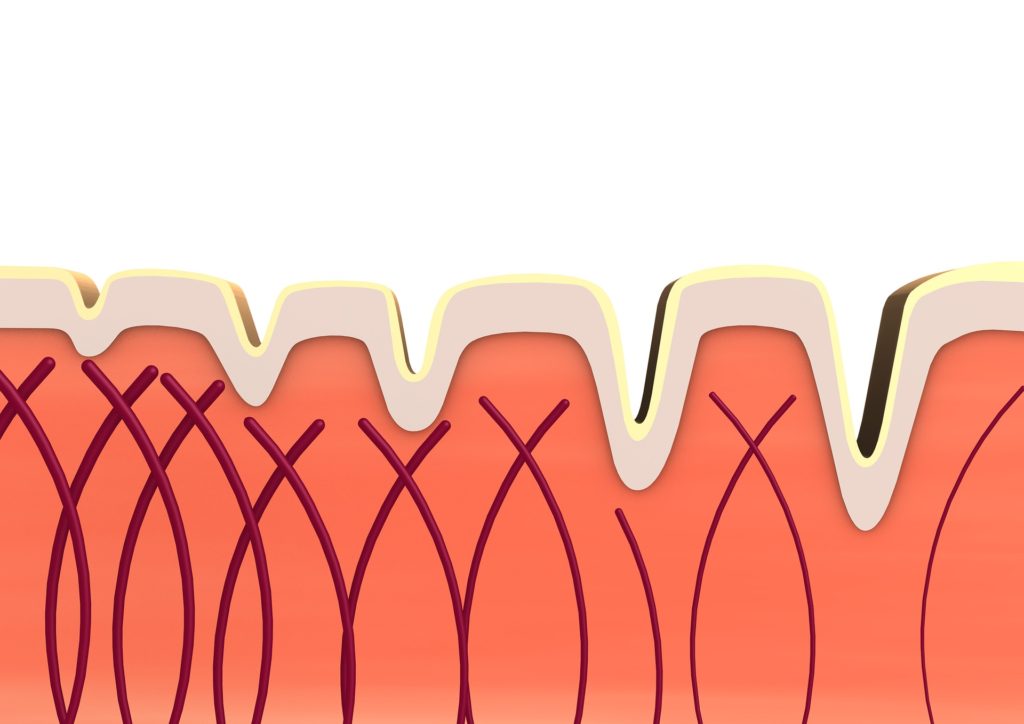Collagen is a protein that gives the skin its elasticity. It also protects against environmental damage and inflammation, which cause wrinkles and dark spots.
Collagen occurs naturally in the body, but production decreases with age. There are many benefits of daily collagen supplementation.
Fortunately, there are ways to boost collagen production in the body. Here are some of the best ways to increase collagen in your body:
Eat foods that contain vitamin C.
Vitamin C helps improve collagen production in the body, so it’s important to include fruits and vegetables that are packed with this vitamin.
Some good options include citrus fruits like oranges, grapefruit, and lemons; bell peppers; spinach; kale; broccoli; strawberries; blueberries; guava; kiwi fruit; papaya; and pineapple.
Use a topical vitamin C serum.
The skin absorbs vitamin C serums more effectively than it absorbs creams or lotions because of their smaller molecular structure. Vitamin C serums also work faster because they penetrate to deeper layers of the skin than creams or lotions do.
Collagen keeps your skin elastic, which prevents fine lines and wrinkles. Here is the kicker though, collagen production decreases as we age. So even if you have naturally full, supple skin, over time you will begin to notice it losing its luster. Supplementing with collagen helps combat this natural degradation.
Collagen supplements are also a great way to help your body heal from injuries. Collagen is what makes up connective tissues like tendons, ligaments, and muscles.
As we get older, our connective tissue becomes weaker and can become injured more easily. If you lead an active lifestyle or are looking to improve your recovery times after a workout, supplementing with collagen can be a great way to do so.
How Does Collagen Work
Collagen is the most abundant protein in our body and is the substance that holds us together.
It’s found in our bones, muscles, skin, and tendons, where it forms a scaffold to provide strength and structure.
Collagen is vital for our skin: not only does it help give our skin strength and elasticity, but as we age we begin to lose collagen, which contributes to wrinkles.
Collagen is an essential building block for the entire body, from the skin to the gut, and more. We would literally not exist without it.
How Do You Get More of It
And how can you make sure your diet and lifestyle support the collagen production in your body? We’ve got you covered with this complete guide on how to boost collagen production.
Collagen makes up 75 percent of our skin, which is the largest organ in the body. The collagen fibers that can be seen under a microscope are a bit like a basket weave.
The weave provides structure and strength to the skin. Collagen also helps keep our skin looking young by preventing sagging. As we age, collagen production slows down and our skin loses elasticity.

What is Collagen and Where is it From
What exactly is collagen? How is it produced and where is it sourced?
Collagen is a protein found in animals, namely in the flesh and connective tissues of mammals. It is made up of amino acids: glycine, proline, hydroxyproline, and arginine. It helps to form connective tissue, cartilage, ligaments, tendons, bone, and skin.
Collagen occurs throughout the body, but especially in the skin, bones, and connective tissues. Collagen provides structure and support to these areas of our body. In addition to bones and skin, collagen is also found in muscles.
Collagen accounts for approximately 25% – 35% of all protein in mammals. This makes it the most plentiful protein in your body! Collagen can be found throughout your body but it most commonly makes up your skin.
There are actually 16 different types of collagen — each with its own role — but 80-90% of all the collagen found in your body belongs to types 1, 2, or 3.
Types 1 & 3 are the most common forms of collagen found in your body (80%). They provide structure and strength to your hair, skin, nails, muscles, ligaments, and tendons.
“Collagen is the most abundant protein in our bodies, especially type 1 collagen. As we age, our bodies make less collagen, and the collagen that remains becomes increasingly rigid and brittle.
In times past, people got plenty of collagen from their diet by eating whole animals. But now we tend to eat only the muscle meat, which means we’re missing out on all of the benefits collagen has to offer.
Does Our Body Produce Collagen Naturally
Collagen is an important protein that creates structure in the body’s tissues. It is found abundantly in the skin and bones, giving them structure and form. But does our body produce collagen naturally?
Collagen is a protein made up of various amino acids that forms a kind of “glue” in the body. It can be found abundantly in the body’s tissues, including skin, bones, muscles, blood vessels, and even tendons.
Collagen provides structure to these parts of the body and plays a key role in their function.
Does Our Body Produce Collagen Naturally?
Yes, our bodies do produce collagen naturally! In fact, collagen makes up approximately one-third of all the proteins found in the human body.
The ingredient list for our favorite beauty products is long and complicated, but when it comes to collagen, we like to keep things simple.
Each of our cosmetics contains one active ingredient—collagen—and that’s it.
So how does it work? How does collagen improve the appearance of your skin? Does your body produce collagen naturally? Can you apply collagen directly onto your skin for a more youthful appearance?
The answer to these questions is yes, no, and sort of.
My mother suffered from arthritis. I wondered if there was a natural way to reduce the pain and stiffness she felt in her joints every day. I decided to investigate.
After researching online and speaking with family friends, I found out about collagen supplements. Collagen, a protein that naturally occurs in our bodies, is the most abundant protein in our bodies.
It helps gives structure and elasticity to our skin and bones. As we age, however, our body produces less collagen. Taking collagen supplements can help replace the loss of collagen over time.

Collagen Supplement Benefits
Collagen is a protein that plays an important role in the health of your skin. As you age, your body produces less collagen, and this can lead to the development of wrinkles and sagging skin.
While you cannot stop the effects of aging, you can take steps to reduce the appearance of fine lines and wrinkles. Collagen supplements can help you maintain youthful-looking skin.
Collagen supplements are beneficial for improving skin elasticity and hydration as well as preventing wrinkles.
The supplement contains hyaluronic acid, which helps to improve the moisture content of your skin by holding up to 1,000 times its weight in water.
This increased hydration improves the turgor, or plumpness, of your skin and reduces the visibility of fine lines and wrinkles.
Collagen supplements also contain vitamin C, which is necessary for the synthesis of collagen and has antioxidant properties that prevent free radical damage to your skin cells.
Collagen supplements often come in pill or powder form. Some are derived from animal sources, while others are produced in a lab. Proponents of collagen supplements claim that they can provide the following benefits:
Joint and bone health: Collagen is a major component of your joints, bones, and cartilage.
As you age, your body produces less collagen. Taking collagen supplements may help with osteoarthritis and joint pain.
Skin health: Collagen is one of the most abundant proteins in your skin. It helps to strengthen it by replenishing its supply of amino acids.
It also protects against sun damage and reduces the appearance of wrinkles and fine lines.
Best Collagen Supplement
There are many types of collagen supplements on the market, each with different characteristics. The type of collagen supplement you choose will depend on your needs and goals.
But what about the best collagen supplement? The best collagen supplements for one person may not be the best for another person. So how to find the best collagen supplement for you?
Let’s start with a comparison of some of the most popular collagen supplements on the market:
For example, if you want to maintain healthy skin, a collagen supplement that contains vitamin C is necessary because vitamin C helps your body absorb and use collagen.
Vitamin C also plays an important role in skin health by helping maintain skin elasticity and strength.
Collagen is the most abundant protein in our bodies, especially type 1 collagen. It is found in our muscles, bones, skin, blood vessels, digestive system, and tendons.
As we age, we slowly begin to produce less collagen and therefore our skin begins to sag and wrinkle. This is why it’s so important to consume a collagen supplement or maintain a diet rich in collagen-boosting foods.
Luckily, there are many great options when it comes to choosing the best collagen supplement for your body and needs. Here are some of the best options available today:
To find the best collagen supplement, we rounded up to 20 of the most popular options and sent them to an independent lab for analysis. We then compared our test results against each product’s label claims.
Collagen is the most abundant protein in the body. It’s so important that it’s found in our bones, muscles, skin, blood vessels, and digestive systems.

How Much Collagen Should You Take Per Day
o how much collagen should you take per day? Well, the exact dose depends on the method of ingestion and your individual needs.
But it is generally thought that taking between 10 and 20 grams of collagen daily will lead to improvements in skin elasticity, muscle mass, and energy levels.
If you are taking collagen in powder form, one scoop usually contains anywhere from five to 20 grams of collagen.
If you are taking a pill supplement, a bottle will often last about 30 days and contain about 15 to 20 grams of collagen per bottle.
You’ll want to follow the directions on the packaging for specific dosing recommendations.
The recommended dosage for collagen depends on the product you’re using.
If you’re using a hydrolyzed collagen powder, it is best to follow the directions on the label. Your overall daily dose may be anywhere from 5 grams to 15 grams per day.
If you’re using collagen supplements in pill form, most people take 4 to 6 pills per day of about 10 grams each.
A. Collagen is a protein that promotes skin elasticity. It is the most abundant protein in your body, and it helps form connective tissue, including your bones, cartilage, and muscles.
Other benefits of daily collagen are that it keeps your skin elastic and firm so it doesn’t sag or wrinkle.
As we age, our bodies produce less collagen, causing wrinkles to develop. To supplement this natural loss of collagen, many people take collagen pills to boost their levels of protein.
Before you consider taking collagen pills, you should consult with a doctor.
Your doctor can tell you whether there are benefits of daily collagen supplements that will help you achieve your goals and how much you should take per day.
Explore Further
Best probiotic for digestive problems
Foods That Contain Collagen
Gelatin is a protein substance derived from collagen after it’s cooked. Collagen is found in the connective tissues of animals.
Thus, foods such as chicken skin, pork skin, beef, and fish are sources of gelatin.
Gelatin is the main component of bone broth, which some researchers have found to improve joint health.
Research indicates that gelatin supplements can relieve symptoms of joint pain. Gelatin supplements may also promote the production of collagen in the body
Gelatin, a protein substance derived from collagen after it’s cooked, is a common ingredient in foods and beverages.
Collagen, in turn, is found in the connective tissues of animals. Thus, foods such as chicken skin, pork skin, beef, and fish are sources of collagen.
Here’s a sample of the friendly tone that can be used in this product:
Collagen is an important part of our diet because it hydrates our tissues and keeps us looking young.
If you want to keep wrinkles at bay and maintain healthy hair and nails, eating gelatin or drinking bone broth might just be the solution!
Gelatin is a Protein
Gelatin is a protein substance derived from collagen after it’s cooked. Collagen is found in the connective tissues of animals.
Thus, foods such as chicken skin, pork skin, beef, and fish are sources of collagen. Some notable examples are bone broth, beef tendon, and cod skin.
You’ve probably heard of collagen, the substance that makes our skin look youthful and supple.
Collagen is found in the connective tissues of animals. Thus, foods such as chicken skin, pork skin, beef, and fish are sources of collagen.
How Long Does it Take to See Results?
Collagen turnover is a slow process. As such, no matter your goal for using collagen, it will take at least 8 weeks to experience noticeable results.
Human skin is made up of several layers. The top layer, the epidermis, is primarily composed of keratinocytes, which are produced and pushed toward the surface as they mature.
These dead cells are eventually shed and replaced with new cells by a specialized group of stem cells in the lower layer of the skin called the dermis.
This process occurs continuously throughout our lives. The epidermis is replaced every two to four weeks, while the dermis takes 2 months to be completely turned over.
Collagen is the Most Abundant Protein
Collagen is the most abundant protein in the body, making up about 30% of all proteins. It’s found in all types of connective tissue—skin, bones, tendons, cartilage, muscles—and contributes to the strength and elasticity of these structures.
Collagen also makes up blood vessels and helps with their ability to expand and contract; it even makes up dentin in teeth!
Collagen is essential to our structure and function, but it’s also necessary to our appearance.
Our skin is made up of 40% collagen. A youthful complexion comes partly from having a healthy amount of collagen-rich skin; as we age, that amount slowly decreases, making us look and feel less youthful.
To combat this natural loss of collagen as we get older (or when we sustain damage to our skin via injury), some people turn to dietary supplements.
These claim to increase or support collagen production in the body.
Health Benefits of Collagen
Collagen is a protein that helps keep the body strong, supple, and healthy. It gives your skin elasticity and can even help with wound healing. If you’re interested in the health benefits of daily collagen, adding it to your diet is an easy way to get more of this essential nutrient.
When you think of the word “collagen”, you probably think of the skin-plumping, wrinkle-reducing, anti-aging ingredient in beauty products. But what if I told you that ingesting collagen can also be a health benefit?
Collagen is the most abundant protein in the human body. It’s found in every tissue and is responsible for holding you together.
Collagen is also known as ‘the glue that holds your body together’ because it’s what keeps your joints, ligaments, and tendons strong. Collagen is also an important factor in keeping your skin looking vibrant, smooth, and youthful.
The benefits of collagen don’t stop at the surface of your skin: it’s also good for your hair, nails, bones, eyes, and teeth! Talk about a one-protein-suits-all solution!
The end of the year is coming up, which also means it’s time to start thinking about our health. In addition to eating healthy and getting some exercise, it’s important to make sure that you’re getting enough nutrients in your diet.
Collagen is a protein found in connective tissues throughout the body. Connective tissue supports and gives form to just about every part of us, particularly our bones, muscles, skin, and blood vessels.
It makes sense that if we want healthy bones, muscles, skin, and blood vessels, we should try to get as much collagen as possible. Again, there are many benefits of daily collagen.
Conclusion
To summarize, taking collagen daily will benefit the health of your bones and joints, skin, hair, and nails. In addition to this, it has also been shown to have positive effects on your metabolism, digestion, and heart health.
Collagen is an important building block for many areas of the body which are vital to keeping in good condition.
Taking a daily supplement can help ensure that you’re getting enough collagen to support these areas.
It is clear that collagen supplements are a great form of nutrition for the body.
It provides benefits such as healthier skin, reduced wrinkles, and fine lines, stronger joints, and improved athletic performance.
With all these benefits, there is no reason why you should not try taking a daily collagen supplement.
But you can’t just take any old collagen supplement. You want to know what type of collagen is in the product, how much is it, and where it comes from.
The reason is simple: not all collagen supplements are created equal.
The above article on the benefits of daily collagen has been provided for informational purposes only. Please consult a healthcare provider as you see fit.
Disclosure: I may receive affiliate compensation for some of the links above at no cost to you if you decide to purchase anything. This site is not intending to provide health or financial advice. This is for entertainment only. Please consult a professional as you see fit.
